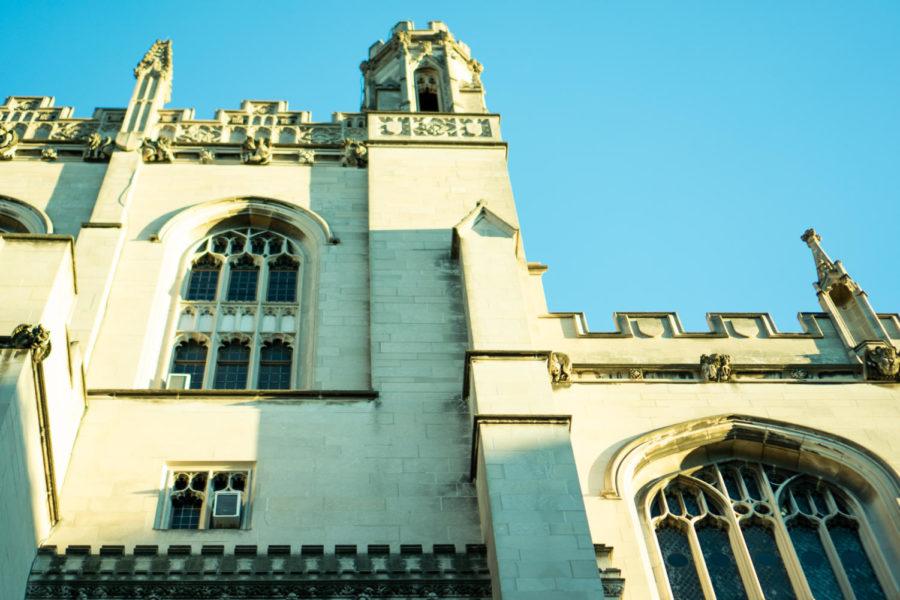The new Student Government (SG) slate elected this week will go into office in fall quarter. The Community, Amplify, Respect, Empower (CARE) slate, consisting of third-years Jahne Brown, Kosi Achife, and Brittney Dorton, will comprise the new Executive Slate.
The run-up to this year’s SG elections saw fiery discourse among the student body surrounding the platforms and individual members of the two groups that ran for the Executive Slate, CARE and Reform.
While a number of students showed their political engagement by commenting on the recently- revived UChicago Secrets Facebook page, or changing their profile pictures to red or pink frames representing each platform, many wondered what exactly SG does, and how the new slate’s policies might affect them.
The CARE slate’s primary focuses are on “transparency, inclusivity, and community.” Their aim for transparency includes improving UCPD accountability, increasing the transparency of University administration and student government, and working on emergency guides to provide information for students facing crises, such as financial or mental health emergencies. For “inclusivity,” they aim to improve support systems for marginalized communities such as students of color, LGBTQ+ students, survivors, those with disabilities, and first-generation/low-income students. These planned improvements include better access to resources such as mental health services, as well as financial support.
But what CARE can achieve in the coming year will depend on the powers and constraints of the office. Here is a brief explainer on the role and structure of SG, and how the Executive Slate fits in.
The SG Constitution states that the purpose of SG is “to further the interests and promote the welfare of the students at the University of Chicago; to foster a University community; [and] to represent the body more effectively before University authorities and the community at large.”
Broadly speaking, SG works to represent students, both undergraduate and graduate, to the Board of Trustees. It passes budgets for student organizations and initiatives such as campus sustainability, along with bills—an example being the Freedom of Information Act, which allows the student body to view all SG executive and legislative records—as well as resolutions. Resolutions are appeals to the UChicago administration to take action on specific issues; resolutions have included urging the administration to establish cultural centers for minority students and reforming student leave policies by making conditions less financially and logistically strenuous on those returning from a leave of absence. Additionally, SG organizes various supports for the student body, such as the Emergency Fund and shuttles to the Midway and O’Hare airports.
SG is organized into four areas: the Executive Committee, Graduate and College Councils, and a number of committees—including the Community Service Fund, the Finance Committee (SGFC), and the Sexual Assault Awareness and Prevention Committee, among others.
The Executive Committee is the primary leadership body for SG. It primarily works to prepare and execute policy, including policy proposed by other SG branches, and also oversees all funding bodies within SG (for example, the Student Government Finance Committee and Annual Allocations). It also places students on University committees, represents the Student Association to the Board of Trustees, and responds to areas of student concern if and when they arise.
Within the Executive Committee, there is the Executive Slate, the Cabinet, the Liaisons (who are the primary point of contact between the student body and the Board of Trustees, as well as Hyde Park, Woodlawn, and the South Side), the Council Chairs (of the Graduate and College Councils), and the Parliamentarian. All the members are elected by popular vote, apart from the Cabinet and the Chairs, who organize meeting schedules and coordinate outside speakers who want to address the assembly. The Graduate and College Chairs are chosen by the Graduate and College Councils, respectively.
The outgoing Executive Slate consists of President Satyen Gupta, and Natalie Jusko and Malay Trivedi as the Vice Presidents for Administration and for Student Affairs, respectively.
The Cabinet includes students with other roles in SG, and members are appointed by the President. While their role varies from year to year, members of the Cabinet generally handle SG’s communication and outreach strategy and have secretarial tasks, such as minute-taking.
The Graduate Council represents graduate students in the College, while the College Council is made up of four members of each of the four undergraduate classes. The Graduate Council represents graduate students to the UChicago administration, and also organizes events for grad students on campus, with an emphasis on encouraging interaction across divisions and schools. Similarly, the College Council plans events for undergraduates, but also approves budget requests and passes resolutions, such as the Security and Response resolution, addressing UChicago’s response to the incident on February 11, involving armed subjects on campus. The Council is made up of four members of each graduating class, but anyone can attend its weekly Wednesday meeting.
SG’s various standing Committees allow SG to handle student needs and provide funding to specific areas of interest. These committees can be applied to through an online application process. Each committee is specific to a type of social or campus initiative, ranging from CORSO (Committee on Recognized Student Organizations) to SAAP (Sexual Assault Awareness and Prevention Committee). One of the Committees, the Program Coordinating Council, oversees college media programming. It consists of representatives from the six PCC groups: the Council on University Programming (COUP), Doc Films, Fire Escape Films, the Major Activities Board (MAB), University Theater (UT), and WHPK Radio Station.
In addition to its standing committees, SG also creates subcommittees to work on specific short-term projects. There are also external committees, to advise Campus Dining, Student Health, and Transportation and Security.









